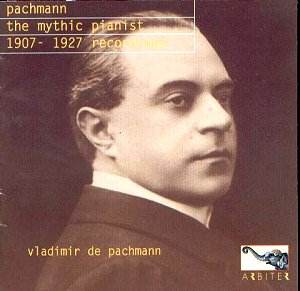From the G&Ts of 1907 to the Victors of 1927
the troublesome genius of Vladimir de Pachmann lives once again
in Arbiter’s well-chosen compilation. His vertiginous rise to
fame and his equally precipitate decline are the stuff of legend,
no less so than his concert antics, his audience-lecturing and
indeed record-buying lecturing (one of the famed "music and
comment" discs is included here, a late HMV). Pachmann followed
such as Anton Rubinstein as one of the titans of the keyboard.
He was known and judged primarily for his Chopin and though he
could point to a reasonably large active repertoire it’s certainly
true that recording companies valued him to a large degree for
Chopin. But even by the time he made the first of these discs
critical opinion had begun to turn against him, to tire of him
and the vaudevillian antics that so debased his talents but so
enlivened the recital circuit. Such excesses and eccentricities
were components of his external nature; they masked a singular,
erratic but at heart exceptionally sensitive musician.
One can best characterise Pachmann’s playing
by noting that these discs fuse digital failings, sometimes acute
ones, with erratic rhythm and voicings but also with glimpses
of a wonderfully singing tone and eloquent and reflective musicianship.
The failures are many and often perplexing but there are moments
when the clouds part and one can, for a brief moment, see a once
dazzling talent still at work. The late, 1927 recording of the
E minor Nocturne – remember that Pachmann was fifty-nine when
he first recorded and in 1927 he was 79 – has far too subdued
a left hand and also moments of loss of structural control. The
tone itself is frequently beautiful but it’s no longer allied
to commensurate acuity of span or, to be fair, digital flexibility.
The D flat Nocturne from two years earlier – an early electric
– is chaotic. When most pressed technically he resorts to uninflected
rushing and the whole thing is a real mess. The extremes of his
rubato usage can be gauged from the 1907 G&T of the C sharp
minor Valse op. 64/2 but the A flat Impromptu, from 1915, redeems
things – finely and persuasively played. We are then immediately
plunged into the next track, the 1912 unpublished Etude in E.
This isn’t the only unpublished performance – the 1911 Mazurkas
are similarly unpublished – but certainly one can but agree with
the Victor testing panel with regard to the Etude. It’s fascinating
to hear Pachmann rush at precisely those moments he shouldn’t,
to hear the serio-comic pecking articulation, the technical flurries,
the unpoetic, tough, utterly externalised and generally inept
traversal of the piece.
Those unfamiliar with him will either delight
to or be appalled by the comments he makes during the course of
a recorded performance – the G flat Etude receives the treatment
here, to generally hilarious effect I always find. Yet he can
still surprise, as with a daringly slow tempo for the Etude in
E minor Op 25/5 and the sheer eloquent power of his 1912 Ballade
in A flat (or part of it, there wasn’t room for the whole thing
on the original Victor). His Mendelssohn Prelude is an admirable
performance, showing him, on a good day in 1927, still capable
of accuracy, rhythmic control and impressive musicality. The terracing
of dynamics is especially noteworthy. He is fine in the Venetian
Gondola Song – a real romantic performance – and even when it
comes to a recital morceaux such as Raff’s evergreen La Fileuse,
Pachmann still stops to bring out those middle voicings.
The transfers have had to contend with some worn
copies. There are the perhaps inevitable and attendant bumps and
swishes - the scuffs and chugging on the Chopin A flat Ballade,
a 1912 Victor, for example, are quite strong. Elsewhere Arbiter
has successfully contained some forte blasting in the 1912 Victor
Nocturne in G. The G&Ts sound pretty well here – the aural
distractions are minor, in fact; the music and the performances
are the thing. The notes are excellent and are by Pachmann’s biographer,
Mark Mitchell. So, yes, uneven, eccentric, frequently impulsive,
often in technical decline but still, on occasion, able to extract
delicacy and eloquence from scores that had been part of his repertoire
for upwards of forty years or more.
Jonathan Woolf

